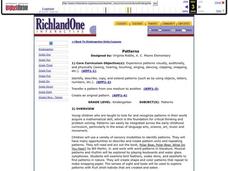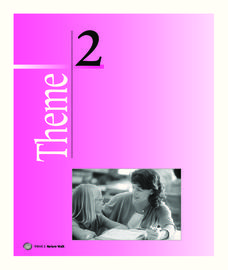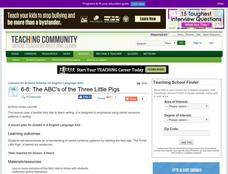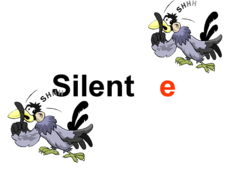K12 Reader
Extending Patterns
2, 4, 6, 8. What comes next? This reading comprehension worksheet discusses patterns and extending patterns. After reading the short article, kids answer a series of questions to demonstrate their understanding of the passage.
Curated OER
Identifying the Patterns
What pattern do you see? Preschoolers examine four visual patterns and complete them after observing the repeating designs. Then, they create two patterns of their own. Because these are all drawn into circles, consider extending this to...
University of Texas
Essential Reading Strategies for the Struggling Reader
Beneficial for beginning readers, struggling readers, and those in need of review, a set of language arts activities is a great addition to any foundational reading unit. Focusing on phonological awareness, fluency, instructional...
Curated OER
Patterns
Students create and extend patterns. In this pattern lesson, students learn to identify patterns using multiple senses. Students work at centers in small groups to explore and extend their understanding of patterns.
Curated OER
Shapes and Patterns in Art and Oceans
First graders draw, cut out, and design their own fish shapes by cutting out shapes and putting them together. In this shapes and patterns worksheet, 1st graders also construct a stamp and print patterns with stamps to repeat a...
Curated OER
Phonics Instructional Routine: Read and Write Words with Consonant Digraphs
Use consonant digraphs to introduce learners to word patterns and high frequency words. They observe a chart with the digraphs /sh/, /ch/, /th/, and /wh/. After listening to each of these phonemes, scholars watch as the teacher...
Curated OER
Red Circle, Red Circle, What Do You See?
Young learners explore shapes and colors. They listen to Brown Bear, Brown Bear What Do You See? by Bill Martin Jr. and use the same language pattern to create a color and shape book of their own. After that, with the leftover magazine...
Houghton Mifflin Harcourt
Nature Walk: Extra Support Lessons (Theme 2)
Reinforce concepts such as long vowels, spelling patterns, sound clusters, double-final consonants, and syllables with a nature-themed unit. Through a series of extra support lessons, learners compare and contrast using a...
Curated OER
The ai and ar Sounds
These words sound the same but are spelled differently, giving scholars a chance to practice spelling patterns and rhyming words. First they read that the /ai/ vowel sound can be made with three different spellings. Learners label three...
Curated OER
The ABC's of the Three Little Pigs
Writers use varied sentence patterns. They listen to the story of Cinderella rewritten so that each sentence starts with the next letter of the alphabet. They create their own version of The Three Little Pigs using the same concept.
Curated OER
Family Quilts Keep us Warm
Students explore families and culture. In this family and culture lesson, students discuss their families and their similarities and differences. Students read the book The Keeping Quilt by Patricia Polacco and create their own quilt...
Curriculum Corner
Be a Speed Reader
Young learners speed their way toward fluent reading with a hands-on consonant digraph activity. Using the numbered grid included in this resource, children roll a die and choose a word corresponding to the number they rolled. They...
K12 Reader
The Note Was in Code!
While it's quite an ode, this short poem uses the long /o/ sound repeatedly in words like code, note, alone, and phone. Kids read the selection and answer three comprehension questions about the text.
Texas Center for Learning Disabilities
Second-Grade Comprehension-Based Intervention
Help your youngsters find meaning in the text they read with this series of five intervention lessons. Offering explicit, step-by-step instructions for walking children through shared readings of leveled books, these...
Curated OER
Silent "e"
Large font and colorful images allow your students to study words including the silent "e". There are a total of nine words on separate slides with the consonants and vowels typed in different colors. Tip: While reading the...
Curated OER
Shapes in Art, Shapes in Body
Students explore body movement. In this shapes and dance lesson, students demonstrate body movements and positions that resemble simple shapes. Students read I Spy Shapes in Art by Lucy Micklethwait and choose shapes from the...
Curated OER
Fairy Tales
Students listen as the teacher reads fairy tales to students and identify patterns. They listen as the teacher re-reads the fairy tales and signal or recite patterns as they listen. Students identify patterns in the fairy tales. They...
Curated OER
Whose History Is It Anyway? Patterns in History
Read and examine primary source material in order to analyze, synthesize, and debate information about the Great Depression. Critical analysts research various source materials related to the Great Depression. They work in teams to...
Curated OER
Mouse Mess
Scholars practice rhyming and phonemic awareness using trade books and poetry. They will listen to the book Mouse Mess several times throughout the week, identifying rhyming words, and matching words that begin with the same sound. Then...
Curated OER
Patterning Fun
Students practice making patterns with paint and stamps. In this arts and crafts lesson plan, students utilize the floor of their classroom to create a giant pattern on the floor using different colored paints and foam stamps....
Houghton Mifflin Harcourt
Family Time: Extra Support Lessons (Theme 5)
Provide extra support with a unit that follows a teach, blend, guided practice, and practice/apply routine to reinforce reading, grammar, vocabulary, and writing skills. Reading and writing lessons include supporting details,...
Houghton Mifflin Harcourt
We Can Do It!: Extra Support Lessons (Theme 10)
Scholars participate in chants, grand discussions, and complete practice pages in a We Can Do It! themed unit. Designed to provide extra support, the assortment of lessons cover topics such as r-controlled vowels, comparatives...
Tayasui.com
Drawing with Carl
Who is Carl? Carl is a little monster that will help your learners draw and create in any way imaginable. Get those kids to activate creative and imaginative thinking skills with a really fun app. There are endless options that can...
K12 Reader
The Thin Pin Can Spin
Words that end with -in are the focus on this worksheet. Learners read a short poem that includes quite a few -in words to identify and practice and then answer three reading comprehension questions.























